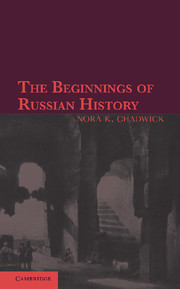Book contents
- Frontmatter
- Dedication
- Epigraph
- Contents
- Preface
- Chapter I The Early Records
- Chapter II The Early History of Kiev
- Chapter III Greek and Oriental Evidence
- Chapter IV Vladimir I
- Chapter V The Treaties with the Greeks, and Russian Heathenism
- Chapter VI Yaroslav the Wise
- Chapter VII Voevoda and Kormilets
- Chapter VIII Vladimir Monomakh
- Appendix I Extract from Ibn Miskawaih, in The Eclipse of the 'Abbasid Caliphate, Vol. v. Translated from the Arabic by D. S. Margoliouth
- Appendix II The Scandinavian Background: Oddr Víth-förli (Örvar-Oddr)
- Index
Chapter II - The Early History of Kiev
Published online by Cambridge University Press: 05 June 2016
- Frontmatter
- Dedication
- Epigraph
- Contents
- Preface
- Chapter I The Early Records
- Chapter II The Early History of Kiev
- Chapter III Greek and Oriental Evidence
- Chapter IV Vladimir I
- Chapter V The Treaties with the Greeks, and Russian Heathenism
- Chapter VI Yaroslav the Wise
- Chapter VII Voevoda and Kormilets
- Chapter VIII Vladimir Monomakh
- Appendix I Extract from Ibn Miskawaih, in The Eclipse of the 'Abbasid Caliphate, Vol. v. Translated from the Arabic by D. S. Margoliouth
- Appendix II The Scandinavian Background: Oddr Víth-förli (Örvar-Oddr)
- Index
Summary
The account of early Russian history contained in the Povêst opens with antiquarian speculation based on the Biblical narrative of the division of the World among Shem, Ham and japhet, and derives the Slavs from Japhet himself. The Slavs are described as dispersing from a single centre in their original home, which is here stated to have been on the Danube. This is followed by a passage —very interesting in its implications—which gives a brief account of the great river system of Russia, and its use as a network of what we might call trunk roads by which the Slavs obtained contact with the outside world. Next comes a very valuable account of the distribution and characteristics of the various Slavonic tribes, such as the Slavs on the middle Dnepr, here described as Polians, ‘the dwellers on the plains’ (Russian pole, ‘plain’ or ‘steppe’). Then come the Drevlians, ‘the dwellers in the forest’ (Russian derevo, ‘tree’), immediately to the west, and the Dregovichi to the north-west, both of which tribes are described as being independent principalities. The Severians to the north are mentioned next, and many others follow. It is worth noting that the Slavs are described as already in existence as an independent principality at Novgorod at this early date. The Khazars are recognised as having dwelt to the east, while the Slavs were still on the Danube, and the successive sweeps over the plains of south Russia made by the Bulgars, the White Ugri or Hungarians, the Avars, the Pechenegs, and the Black Ugri or Hungarians (i.e. Magyars), all from the eastern steppe, are briefly recorded.
The Polians are described as a number of small self-governing units living peaceably together at this period. The chronicler then goes on to tell us that there were in early times three brothers known as Kiy, Shchek and Khoriv living on the middle Dnepr, together with their sister Lybed. The name of the latter is also that of a small tributary of the Dnêpr, Kiy and his brothers are said to have lived on three hills where Kiev now stands, and we are told that they built a town and named it Kiev after their eldest brother. The town is said to have been surrounded by pine forests inhabited by wild animals.
- Type
- Chapter
- Information
- The Beginnings of Russian HistoryAn Enquiry into Sources, pp. 17 - 39Publisher: Cambridge University PressPrint publication year: 2013



